
Table of Contents
Your mornings deserve more than the same old routine, and Korean breakfast foods offer an exciting, flavorful way to start your day. Whether you’re a food enthusiast or exploring Korean cuisine for the first time, these dishes are sure to captivate your palate. Drawing from a rich culinary tradition, my grandmother’s handwritten recipe book often guided my first steps into Korean cooking. Today, I’m sharing that inspiration with you, highlighting seven must-try dishes that combine taste, nutrition, and culture.
Why Korean Breakfast Foods Stand Out
Korean breakfasts aren’t just about sustenance; they’re a reflection of balance and mindfulness. They combine savory, spicy, and umami flavors with nutrient-rich ingredients, often featuring probiotics, lean proteins, and wholesome grains. The variety ensures you’re not only full but energized throughout your day.
Let’s dive into seven iconic dishes that showcase the best of Korean breakfast cuisine.
1. Kimchi Jjigae (김치찌개): The Hearty Comfort Stew
Few dishes warm the soul quite like kimchi jjigae, a spicy and tangy stew. This staple uses aged kimchi, tofu, pork, and aromatics for an unforgettable depth of flavor.
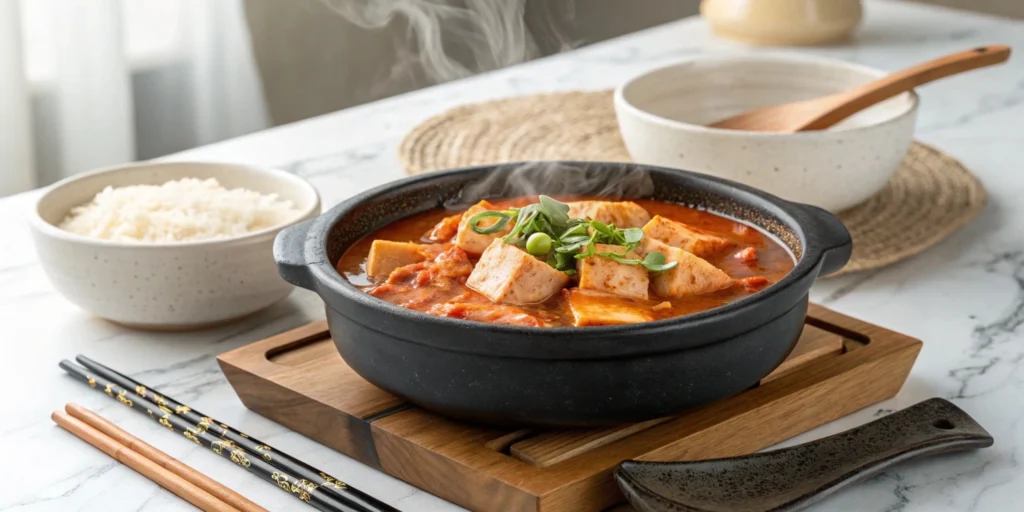
Ingredients You’ll Need:
- 2 cups of aged kimchi
- 200 grams of pork belly (thinly sliced)
- 1 block of firm tofu (cubed)
- 3 cups of water or anchovy broth
- 1 tablespoon of gochugaru (Korean red pepper flakes)
- 1 teaspoon of sesame oil
- 1 green onion (sliced for garnish)
How to Make It:
- Heat sesame oil in a pot and sauté the pork until lightly browned.
- Add kimchi and gochugaru, cooking for 3 minutes to release the flavors.
- Pour in water or anchovy broth and bring to a boil.
- Add tofu and simmer for 15 minutes.
- Top with sliced green onions and pair it with freshly cooked steamed rice.
Pro Tip: For added depth, use kimchi that’s been fermenting for at least two weeks.
2. Baekban (백반): The Classic Korean Breakfast Set
Baekban is a humble yet satisfying meal composed of rice, soup, and an assortment of banchan (side dishes). Each bite offers a new texture and flavor, making it an interactive and customizable dining experience.
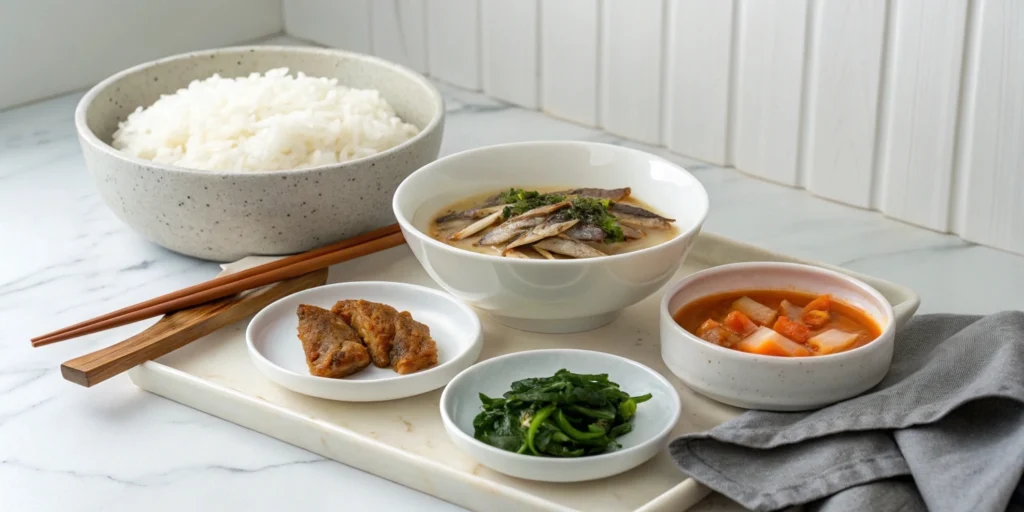
Typical Components of Baekban:
- Steamed rice
- Soup (like soybean paste soup or seaweed soup)
- Banchan (such as seasoned spinach, pickled radish, or stir-fried anchovies)
Health Benefits: This set meal provides a well-rounded balance of carbohydrates, proteins, and vitamins, giving you a wholesome start to your day.
Tip: Prepare banchan in bulk and refrigerate to save time on busy mornings.
3. Jeon (전): Crispy Savory Pancakes
Korean pancakes, are a versatile breakfast option. Whether you prefer scallion pancakes, seafood pancakes, or kimchi pancakes, these golden treats are crispy on the outside and tender inside.
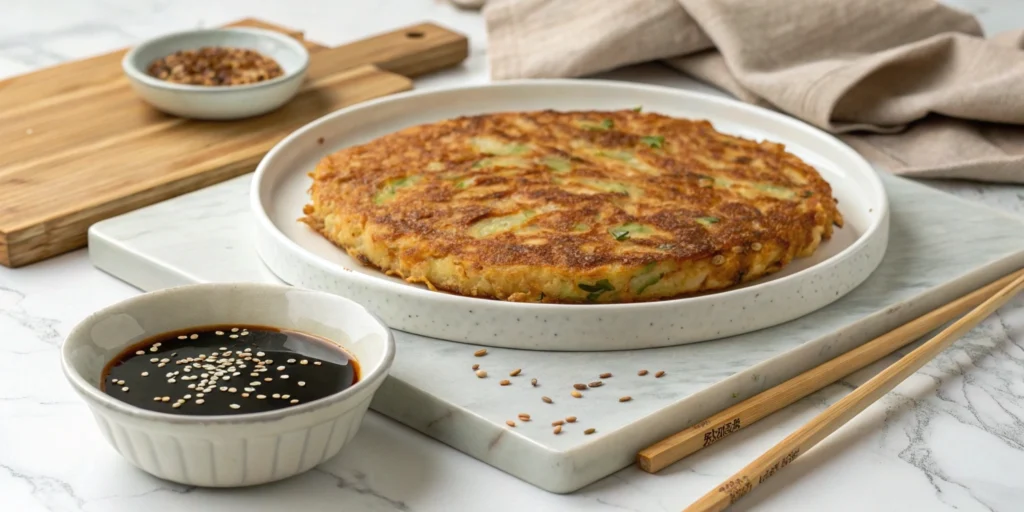
Ingredients for Kimchi Pancake:
- 1 cup of chopped kimchi
- ½ cup of kimchi juice
- 1 cup of all-purpose flour
- ½ cup of water
- 2 tablespoons of vegetable oil
Instructions:
- Combine kimchi, kimchi juice, flour, and water in a bowl. Mix until you achieve a batter consistency.
- Warm oil in a non-stick skillet set to medium heat.
- Pour the batter into the pan and spread evenly.
- Cook for 3-4 minutes on each side until golden and crispy.
Serve with a soy-vinegar dipping sauce for an extra burst of flavor.
4. Gyeran Bbang (계란빵): The Delightful Egg Bread
Perfect for busy mornings, gyeran bbang is a portable breakfast bread with a whole egg baked into the center. Its slightly sweet and savory taste makes it irresistible.
What You Need:
- 1 cup of all-purpose flour
- 1 teaspoon of baking powder
- ½ cup of milk
- 2 eggs (one for batter, one for topping each bread)
- 2 tablespoons of sugar
How to Make It:
- Mix flour, baking powder, milk, one egg, and sugar into a smooth batter.
- Transfer the batter into the pan, spreading it out for an even layer.
- Crack an egg on top of each tin.
- Bake at 350°F (175°C) for 20 minutes until golden.
5. Jeonbokjuk (전복죽): Luxurious Abalone Porridge
This silky rice porridge with tender abalone slices is a breakfast delicacy. Jeonbokjuk is light yet packed with protein and minerals, making it both nourishing and satisfying.
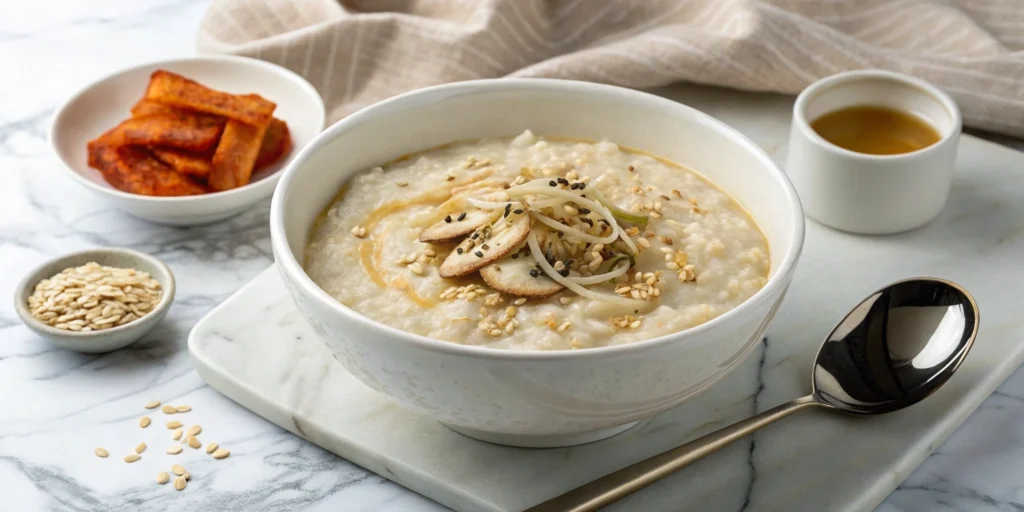
Key Ingredients:
- 1 cup of cooked rice
- 2 fresh abalones (cleaned and sliced)
- 4 cups of water or broth
- 1 teaspoon of sesame oil
How to Prepare:
- Sauté abalone slices in sesame oil for 2 minutes.
- Add rice and water, simmering until the porridge thickens.
- Season with a pinch of salt and serve warm.
6. Miyeokguk (미역국): Nutrient-Rich Seaweed Soup
Traditionally served on birthdays, miyeokguk is a popular breakfast choice for its light flavor and nutritional benefits.
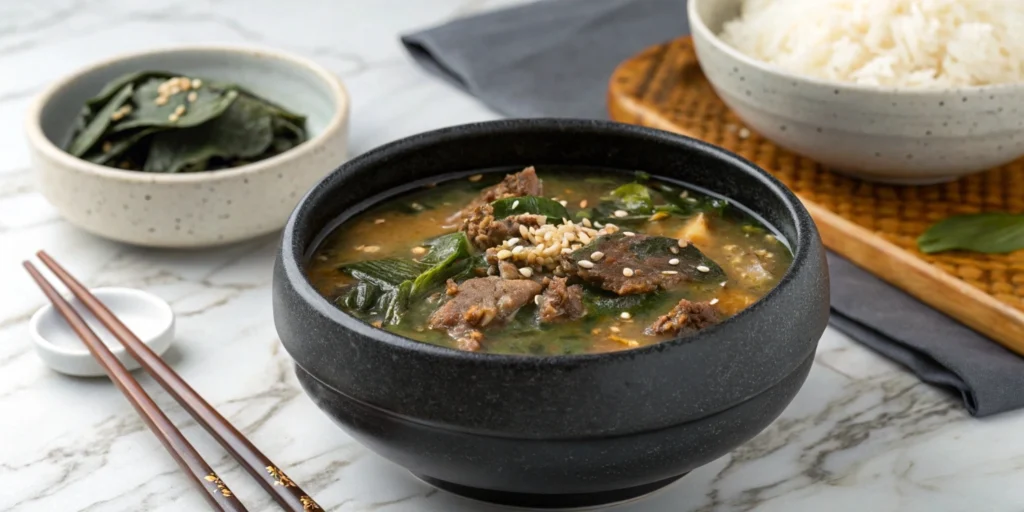
Ingredients:
- 1 cup of dried seaweed (soaked and drained)
- 100 grams of beef slices or clams
- 1 tablespoon of sesame oil
- 4 cups of water
- 1 tablespoon of soy sauce
Steps:
- Heat sesame oil in a pot and sauté the beef or clams until cooked.
- Add seaweed and cook for another minute.
- Pour in water, bring to a boil, and simmer for 20 minutes.
- Season with soy sauce before serving.
7. Tteokguk (떡국): Rice Cake Soup for Prosperity
Tteokguk, a symbolic dish eaten during Lunar New Year, is also a comforting breakfast option. The chewy rice cakes paired with a savory broth make for a hearty meal.
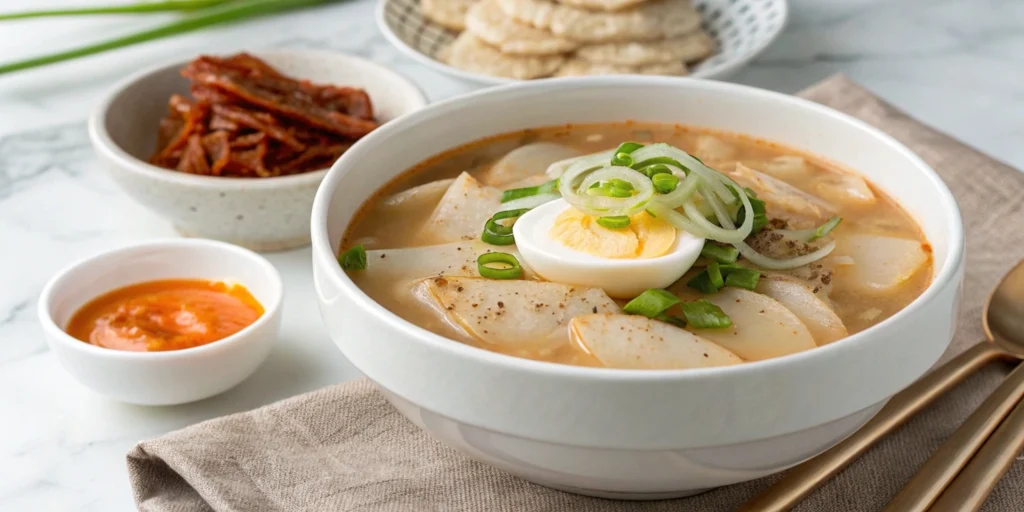
Ingredients:
- 2 cups of sliced rice cakes
- 4 cups of beef broth
- 1 egg (beaten)
- 1 green onion (sliced)
- 1 teaspoon of sesame oil
Directions:
- Boil the beef broth and add rice cakes. Cook until they become tender.
- Stir in the beaten egg slowly while stirring.
- Garnish with green onion and sesame oil before serving.
How to Incorporate Korean Breakfasts into Your Routine
Tips for Beginners:
- Start Simple: Gyeran bbang or kimchi pancakes are easy to prepare.
- Make Ahead: Cook large batches of soups and freeze portions.
- Mix and Match: Pair traditional dishes with your favorite sides for a fusion twist.
Benefits of Korean Breakfasts:
- Rich in probiotics, supporting gut health.
- High in essential vitamins and minerals for energy.
- Balanced flavors to prevent sugar crashes.
FAQs About Korean Breakfast Foods
What are the most popular Korean breakfast foods?
Kimchi jjigae, gyeran bbang, and baekban are among the favorites. Each offers a unique flavor and texture.
Are Korean breakfasts healthy?
Yes! They emphasize balanced nutrition with fermented foods, lean proteins, and wholesome grains.
Can you make Korean breakfasts ahead of time?
Absolutely. Soups like miyeokguk and banchan can be prepared in bulk, saving time on busy mornings.
Conclusion: Elevate Your Mornings the Korean Way
Korean breakfasts are a celebration of flavors, nutrition, and tradition. From the hearty warmth of kimchi jjigae to the quick delight of gyeran bbang, these dishes promise to bring excitement and energy to your mornings.
It’s time to step into your kitchen, try these recipes, and share the joy with your family and friends. Who knows? One of these dishes might just become your go-to breakfast favorite!
Start your day the ecstatic way—with Korean breakfast foods!
